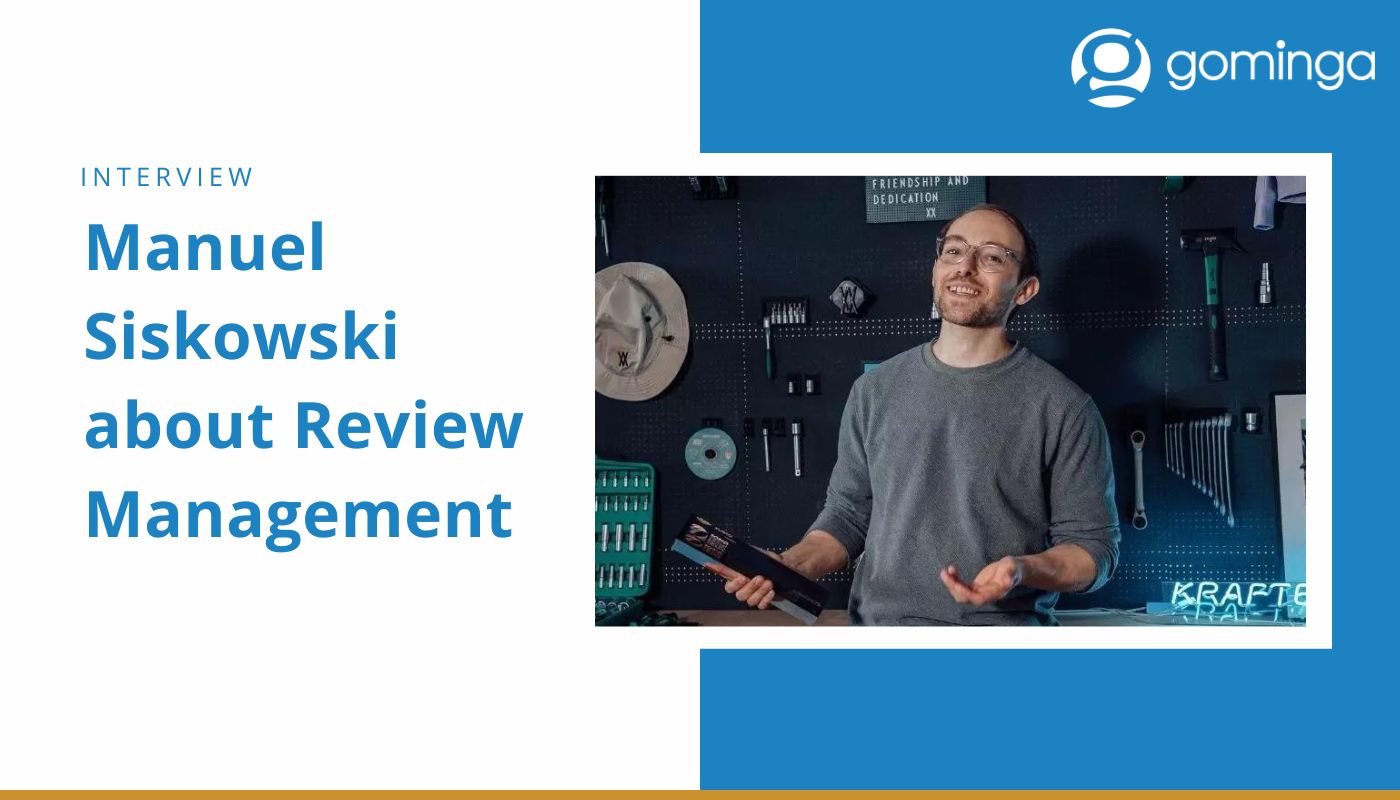
Founder and CEO of Wiesemann 1893, Manuel Siskowski, is considered the e-commerce expert. His areas of expertise include Amazon FBA and digital B2B commerce. His goal is to become the leading digital tool brand with his brand WIESEMANN 1893.
In an interview, we had the opportunity to talk with Manuel about the topic of review management with the software solution.

Marketplaces and Review Management
I heard from my colleague Christian that you read your reviews daily. What does your daily morning routine look like?
Manuel Siskowski: I usually get an email around 10am/11am with all the reviews from the last 24 hours and if I have enough time, I go through them all. In most cases, I honestly only go through the ones that are under 4 stars, so 3 stars or below and try to get an overview of where the problems are right now.
You focus mainly on Amazon. Why are other EU marketplaces uninteresting for you at this point?
M. S.: I think if you look at the numbers, in the example of Germany, Amazon has a 55% market share. For us, it is purely a question of prioritization. We can work through most of the market there with the least amount of effort and after that it becomes relatively granular, especially in our DIY market area, and the other marketplaces are then usually too small.
What do you think of the ManoMano marketplace?
M. S.: In France, I find it extremely exciting. In their home market, they are already very far along, and they are currently growing very strongly, so it is very interesting, but in Germany it is not yet an interesting critical mass.
Back to the reviews. How important are reviews on Amazon for you, especially for your own products?
M. S.: So on the one hand, it’s the positive influence on the conversion rate, which is of course the huge advantage. In addition, we try to use the knowledge gained in various places. On the one hand, on the quality side. We try hard to monitor how reviews in products and product groups develop over time. This is then cross-referenced with the batches that we produce. This enables us to identify problems within a batch as well as react as quickly as possible to fluctuations in production quality.
What role do product questions play for you? Do you analyze or answer your product questions? Is answering product questions a helpful way to communicate directly with the end customer?
M. S.: We try to use them as much as possible. For us, that’s totally interesting, especially at the beginning of a product launch. As soon as a product question comes up, it means that we haven’t explained the product sufficiently on the content page. We take this as an opportunity to analyze. We see which questions are still open and where we can optimize our content. But you also have to be honest, with many questions you notice that the customers have either not understood the product at all or the content has not been read sufficiently. At this point, too, it becomes clear that there is a need for explanation or optimization on the part of the company. This is where customer service comes into play. Comprehensive customer service is indispensable for any successful company. Consequently, product questions identify areas that are not yet sufficiently comprehensible to the customer.
”At this point, I don't understand at all why review data is not used much better. In my opinion, it's much more qualitative and much better than traditional market research data.
Manuel SiskowskiCEO of Wiesemann 1893
Correlation between product reviews and buying decisions
Do you see a direct correlation between product reviews and purchase decisions?
M. S.: Yes, in any case, a connection is definitely visible. We say that a product works really well from 100 reviews.
Do only positive product reviews lead to a purchase decision? What about negative reviews? How do you deal with them?
M. S.: The first thing I do when I’m not sure about a product, I look at the reviews and filter from the bottom up. Of course, I look at negative reviews. That way I can clearly see what didn’t go well and get a pretty good feel for what the downsides are with a product or with an offer. It’s much more exciting to read a one-star review than a five-star review. We always try to respond to them and try to find a relatively easy solution for the customer. The interesting thing is that negative reviews also have a positive aspect. Customers who have experienced a bad experience and left a negative review are often willing to update their review after a consequently good product experience. If the customer now reads that a one-star review is now followed by another update, then this awakens a feeling of security in a new customer. The customer sees that even if something goes wrong, it will be taken care of.
Would you say that the content obtained through the reviews could replace market research?
M. S.: Personally, I often don’t understand why market research is still so important in very traditional companies. To be honest, market research data is extremely artificial in most cases. Especially when you work with paid groups and they are not real customers at all. Thus, artificial data is generated. Right now, you can find honest opinions and honest feedback on every product on the internet. At this point, I don’t understand at all why this data is not used much better. In my opinion, it is qualitatively much more meaningful and much better than traditional market research data. Of course, that doesn’t always work out now, especially in the pre-launch phase, but in my opinion the data is much more meaningful and much more valuable for products from launch on.
Do you think product reviews are currently getting the attention they deserve in companies?
M. S.: In our company, I would say yes. With the others, it is hard for me to assess, but from what I have heard, it is not really a big issue. I think it is absurd, if there are sometimes whole departments for market research, then you would have to go and there would have to be an analysis department for customer evaluations, because you could exchange it 1:1. So I think that honestly a lot of people haven’t realized that yet because, it’s a huge cost saving.
What trends and developments will there be in terms of review management?
M. S.: I think the problem that many brands have is that customers leave different data points at different steps in the customer journey. So data exists on different platforms, in different languages, and in different systems. That’s the big problem. I can get a customer feedback in a customer service email that goes through my own channel. I can get a customer feedback on a social media, for example, under an Instagram post. But at the same time, I can have a totally exciting review on Amazon Brazil or Amazon Turkey. The problem is often I don’t really understand the language. I think the interesting point that needs to be solved in the next few years is to centralize everything and then also get the possibility to play things back at different points. For example, I sell on Target USA and can use customer ratings relatively well in my own store in Germany, and I think that’s the point. There are also a few legal things that still need to be clarified that are not so trivial. But that’s where I think every brand and every company could get the most out of it.
The interview was conducted by Albina Schönberger from gominga on July 28, 2021 with Manuel Siskowski.
Further information on Manuel Siskowski and his projects: www.siskowski.com
